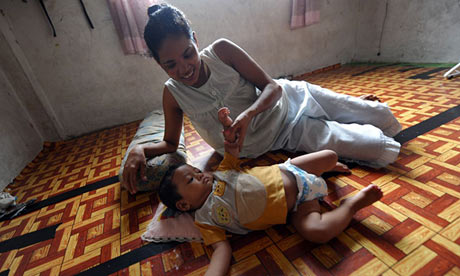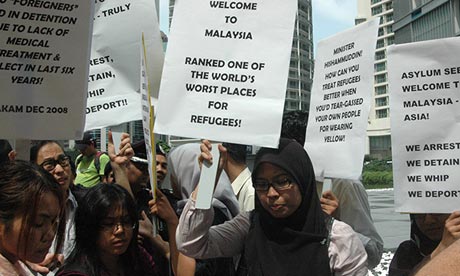Anti-trafficking group says refugees registered with the UNHCR are among those held in crackdown
theguardian.com, Wednesday 4 September 2013

About 110,000 refugees are registered with the UNHCR in Malaysia. Photograph: Mohd Rasfan/AFP/Getty Images
Refugee advocates have accused Malaysian authorities of "supporting fraud and abuse of migrants" after a crackdown on illegal migrants in the country saw thousands of people arrested, allegedly including asylum seekers and children.
Malaysia began its largest operation to date on Monday to track down, detain and deport the half a million undocumented illegal workers living in the country.
Immigration department deputy director Saravana Kumar told Bloomberg on Tuesday that a total of 2,433 people had been arrested during 40 simultaneous operations by the immigration department, army, police and local councils.
Malaysia-based refugee advocacy and anti-trafficking group Tenaganita has said that asylum seekers awaiting processing through the UNHCR are among those detained, and allege that some immigration officials are not accepting UN letters stating the person is currently being processed as valid documentation. Malaysia does not officially recognise refugee status.
"We have about 110,000 or so refugees registered with the UNHCR and between 50,000 and 70,000 who are still seeking asylum, so they have not been registered yet," Tenaganita's Katrina Maliamauv told Guardian Australia.
People from both groups, including children and elderly people, are among those arrested, she said.
"What we've been hearing – at least for the refugees with their cards – is that they've been released within a day as soon as UNHCR can verify their cards. For those who are still waiting to be registered, they are still in detention. That's the group that we are extremely concerned about because we don't know what access UNHCR has to them or what opportunity they have to seek support or intervention or to state that they are asylum seekers."
Tenaganita claims that some refugees are in hiding, fearful of arrest and detention as authorities seek out illegal workers who did not come forward during a 2011 amnesty.
"We have also been told that migrants can choose to either be deported or pay to enforcement officers between RM1000 to RM1500 [$340 to $500] between a stipulated time frame to be released," the release said.
Refugees are not allowed to work under Malaysian law but many do as the only means to support themselves, and Tenaganita were told that employers found to have refugee workers would be fined between RM5,000 and RM10,000 ($1,600 to $3,400).
About 1.3 million visa overstayers signed up for permits during an amnesty in October 2011, with 500,000 processed for legalisation and 333,000 repatriated. However, more than 400,000 workers remain undocumented, according to government estimates.

Protesters in Kuala Lumpur campaign against Malaysia's refugee policy. Photograph: Karlis Salna/AAP
This is the second crackdown on workers who did not come forward in 2011.
Maliamauv said there was a second major issue with the crackdown, in that the amnesty which "was meant to be a pathway for undocumented migrants to obtain valid work permits or be repatriated without penalty" has resulted in corrupt processes, which took money from migrants seeking registration but left them targeted by the current crackdown.
They say the outsourcing of the amnesty process to 277 companies has resulted in "exorbitant fees" for migrants, who discovered after paying that their work permit was registered to a shell company created by the outsource organisation, with no actual job for them.
"In Malaysia, once you have a valid work permit and a valid passport, if you don't work for the particular company that's listed on your work permit then that is also an offence of the migration act," said Maliamauv.
"If you don't have your valid work permits and passports then you're considered an undocumented person or referred to as an illegal migrant."
Tenaganita said that the organisation's experience in monitoring the treatment of migrants who are arrested, detained and deported showed "a disturbing pattern of continuous human rights violations".
"Migrants have in the past reported physical and verbal abuse at the hands of enforcement officers, with migrant women facing the additional risk of sexual violence," said a release.
No comments:
Post a Comment